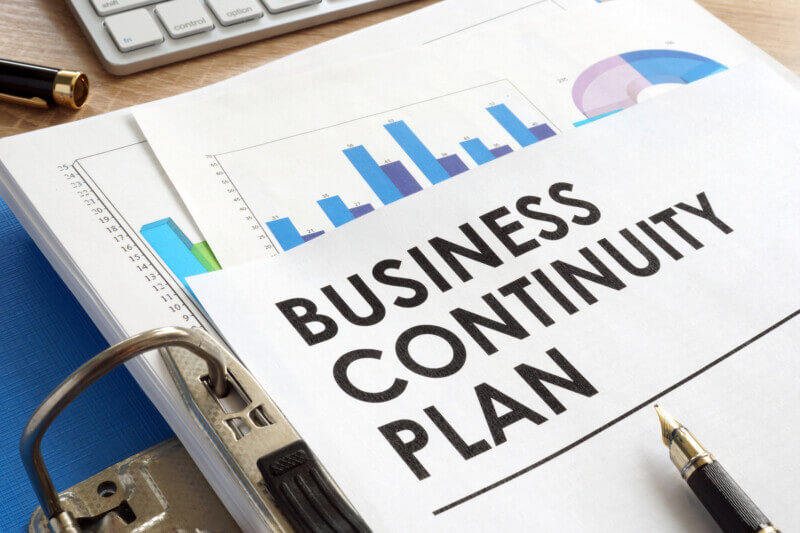We work with a lot of businesses and commercial properties at Venture Construction Group of Florida (VCGFL). Businesses and commercial property owners absolutely need a Business Continuity Plan in place. According to FEMA, 75% of businesses without a Continuity Plan will fail, 40% of small businesses won’t reopen after a storm event, and 25% of businesses will close within one year after a storm or natural disaster. Don’t be a statistic!
What Is A Business Continuity Plan?
A Business Continuity Plan is the blueprint that will enable operations before, during and after a major storm event or natural disaster. This is your written plan that includes company operational details and outlines which staff, materials, procedures and equipment are critical to keep the business operating, and how you will continue to function.
A Business Continuity Plan lays the groundwork for recovery in the event your business is affected by a major storm or weather event. This can involve a risk assessment, client communication plans, protocols for your computer networks, data, server, IT, and infrastructure, as well as staff roles and responsibilities, and a list of key contacts. A storm event is frustrating enough! This important plan will help your company get through it.
Get Started – Business Continuity Planning
- Risk Assessment
Assess potential risks to your business and how they may impact your ability to deliver your services or products. i.e. Are you located in an area prone to hurricanes, tornadoes, or flooding, or storm surge? How will your business survive in the event this happens, or you’re without power or electricity for a period of time?
- Contact List Distribution
Create a list of your essential contact information including emails and phone numbers of your key personnel, residents, customers, vendors, suppliers, and/or whomever you do business with. Ensure the list includes your local electrical and utility companies and internet service providers for all office locations. It’s essential to add in your insurance agent contact details and policy information, as well as any financial and legal contacts. Be sure this is easily accessible by your core team and backed up on the cloud.
- Employee Roles & Responsibilities
Many companies define a core team to build and manage the Business Continuity Plan. After it’s created. be sure to solicit feedback from all of your staff members to ensure there is no detail left behind. In your plan, clearly outline staff roles and responsibilities in the event of a storm, including their locations. It’s often ideal to spread the responsibilities out, as one area may be affected with an internet or power outage while another area may be fully functional. Share the staff contact lists and ensure that these are electronically distributed, printed, saved in a secure location and backed up on the cloud. Create an org chart with clearly defined roles and discuss with the team in advance so everyone is prepared.
- Identify Secondary Vendors/ Suppliers
It’s important to identify backup vendors, suppliers and technology companies in the event their systems are also down and they cannot help you meet your business needs.
- Plan for Technology Recovery
Backing up your data consistently is a core operation every day of the year, regardless of storm events. This is absolutely essential. Back up to a cloud, a separate server in the event yours goes down, and/or an off-site storage location. Ensure that your essential personnel have the confidential sign in information and passwords to access necessary data.
- Communication Is Key!
Have a clear communication plan outlined for staff, clients, vendors and suppliers. Communication is key throughout recovery!
- Product Inventory
Ensure that you take inventory and maintain documentation and photos of your equipment, products, supplies, etc. This comes in very handy in the event you need to submit an insurance claim.
- Storm & Evacuation Routes
Help your staff and clients be prepared with their local evacuation plans, essential storm apps, and shelter information if applicable.
- KISS: Keep It Simple & Straightforward
The most important thing is to have a plan. Depending on how large your company is and/or how you structure this, Business Continuity Plans can get extremely complex and be one of those things you put off each year. Don’t overcomplicate it. Create your plan and make sure it’s clear and concise for any employee to understand. Experts recommend updating and practicing your plan often.
Specializing in large-scale industrial/ commercial projects, VCGFL assists property managers, commercial property owners, industrial boards, condominium boards, homeowner associations, association boards, high rises, hotels, resorts and business complexes with 3rd party consulting, construction, restoration, roofing, general contractor services and emergency services. VCGFL specializes in storm damage restoration due to hurricanes, tornadoes, hail, water, flood, and fire. With the industry’s leading accreditations, commitment to innovation, multiple awards and a solid reputation, Venture is equipped and ready to help.

